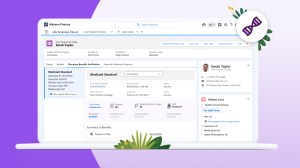With so much business interest in adopting the latest and greatest AI chatbots, it’s pretty easy to miss a fundamental truth behind the hype: consumer chatbot technology isn’t enterprise-ready – and probably never will be.
Why? Because AI assistants are only as good as the data powering them. And, as some organizations are now learning, most large language models (LLMs) rely on information gleaned from public websites — not your more critical business and customer data. This means consumer bots simply can’t adequately help employees sell more products, market more merchandise, or be more productive in their daily engagements and activities given the lack of personalization and business context needed within a workplace.
A different approach is required to reach the vision many people have in mind for AI, where it progresses from living in conversational chatbots that can do a handful of party tricks – like creating pretty good emails, essays, blogs, and graphics – to acting autonomously and sending out digital agents capable of identifying business-critical needs and addressing them with little or need for direct human involvement.
At Salesforce, we see a clear path to AI that takes action and runs routine tasks autonomously, all while adhering to trusted business rules, permissions, and context. Instead of just relying on LLMs, which mainly focus on understanding and generating human-like text without the ability to independently execute tasks, future AI assistants will rely on large action models (LAMs), which integrate decision-making and action-taking processes.
At Salesforce, we see a clear path to AI that takes action and runs routine tasks autonomously, all while adhering to trusted business rules, permissions, and context.
Jayesh Govindarajan, Senior Vice President, Salesforce AI
We’ve been marching toward that vision for a while now and are making considerable progress.
The march to autonomy
The journey started with Salesforce Data Cloud, a trusted, hyper-scale data engine, built on the Einstein 1 Platform, that unlocks and harmonizes trapped data from across the enterprise and third-party data repositories to help companies act on their data. With Data Cloud, enterprises can effortlessly activate their data to automate workflows, personalize customer interactions, and build smarter AI.
In addition, because we believe a move from generative AI to autonomous AI is on its way, with the prompt becoming the primary user interface and interacting with a variety of underlying language models, we released Einstein Copilot, the industry’s first and only conversational, enterprise-class AI assistant. Integrated across the Salesforce stack, Einstein Copilot is grounded in all of an organization’s data, whether it’s behind their firewall or sitting in someone else’s data lake or colocation facility.
It also serves as a planner or reasoning engine, which interprets and determines what a user is trying to accomplish and then interacts with the most appropriate AI model to solve problems, produce relevant content, and advise decisions.
Actions beget actions
Since its launch in February 2024, we’ve been aggressively expanding the library of actions in Einstein Copilot to address specific business needs for people in sales, service, marketing, and data analysis as well as in industries like ecommerce, financial services, healthcare, and education. And we will continue adding more of these innovations over time.
So what do we mean by actions? Think of them as multi-shaped LEGO blocks (tasks) that you assemble in certain ways to make a castle (desired project outcomes). For example, when trying to assess the status of a particular prospect (the project), a sales rep could ask Einstein Copilot for a personalized close plan, insights on why an opportunity may not close in the month, or check if pricing was discussed on a recent call (the tasks). Einstein Copilot goes to work orchestrating those activities, comes up with recommendations for addressing any issues it finds, and compiles everything in a detailed report. Ideally, because the underlying actions know what sales people care most about, that document should be fairly close to delivering what the rep had in mind.
Such scenarios are becoming increasingly possible as we build out the Einstein Copilot library of actions. But the real payoff for this technology will be getting it to not only gather and organize information while providing recommendations but going to the next level and taking action.
But the real payoff for this technology will be getting it to not only gather and organize information while providing recommendations but going to the next level and taking action.
Jayesh Govindarajan, Senior Vice President, Salesforce AI
What AI autonomy looks like
Imagine, for example, a sales rep telling his or her digital agent they are going to visit a certain territory and that they want to meet with the top five prospects in that area. Soon, the AI will not only be able to pore through company historical records and public information to identify the right names. It will also be able to suggest a variety of possible meeting times based on past interactions, ideal travel schedules based on cost and times of day, craft introductory emails asking for meetings as well as “thank you” notes to send afterwards, and even produce talking points the rep can use when getting in a room with the customer. What’s more, with the rep’s approval, the AI assistant will be able to execute any or all of these actions within seconds. That’s just one example of what semi-autonomous or fully autonomous AI looks like. The possibilities are really endless.
Salesforce is in a strong position to deliver on all of them because of the volume and breadth of data housed in Data Cloud, the heavy workflow traffic in our Customer 360 CRM, and the fact we’ve delivered an enterprise-class copilot that is rapidly expanding its library of actions. It will not happen overnight. The technology needs to advance, organizations and people have to be able to trust AI and be trained to use it in the right ways, and more work will need to be done to ensure the right balance between human involvement and AI autonomy. But with our continued investment in CRM, data, and trusted AI, we will achieve that vision before too long.
Salesforce is in a strong position to deliver on all of them because of the volume and breadth of data housed in Data Cloud, the heavy workflow traffic in our Customer 360 CRM, and the fact we’ve delivered an enterprise-class copilot that is rapidly expanding its library of actions.
Jayesh Govindarajan, Senior Vice President, Salesforce AI
Go deeper:
- Say hello to Einstein Copilot
- Learn more about Data Cloud
- Find out How Data, Trust, and Contextual UX Deliver AI Success




















